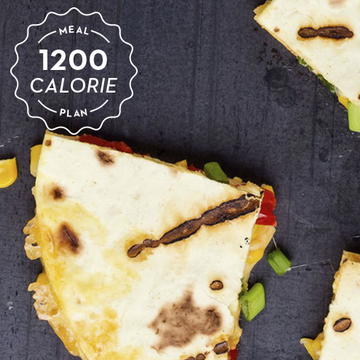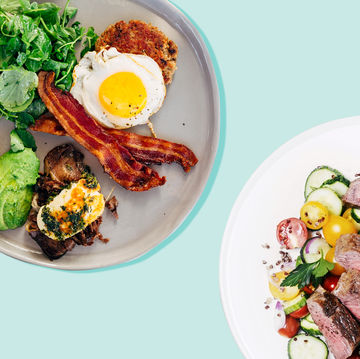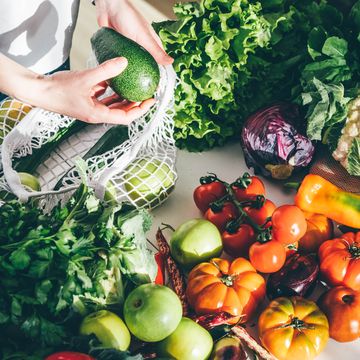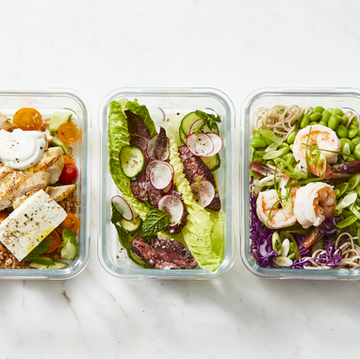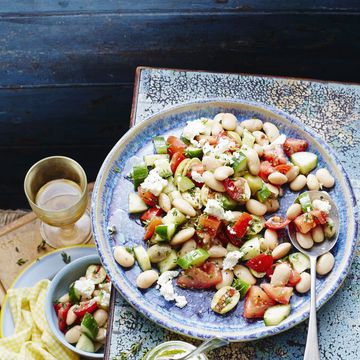The Best 7-Day Mediterranean Diet Meal Plan for Beginners
We're sharing a complete guide and food list to kick-start your healthy eating goals.
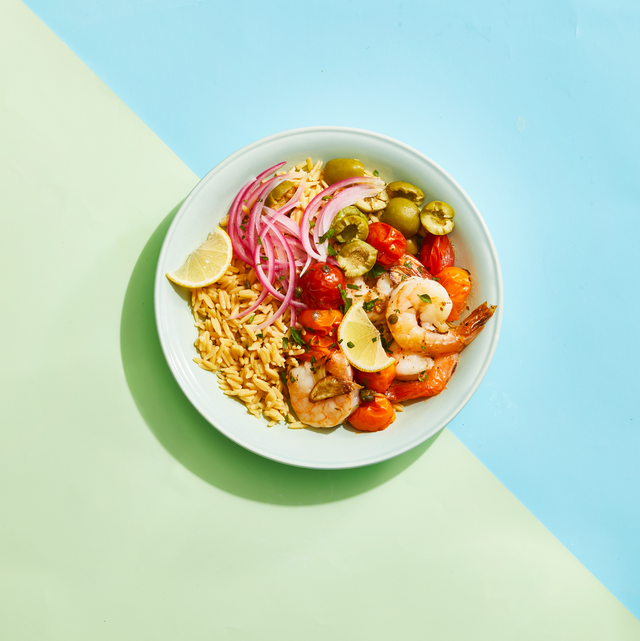
Sitting at a taverna enjoying a delicious Greek salad full of the freshest veggies, and a delectable grilled fish as you stare into the Aegean Sea sounds totally dreamy — but even if you can't spring for airfare to Santorini right now, you can enjoy the health benefits of the Mediterranean-style diet, which is as good for your heart and brain as it is for your taste buds.
Years of research show that consuming a Mediterranean-style diet filled with fresh fruits, vegetables, nuts, whole grains, seafood and heart-healthy fats can help reduce the risk of strokes and total cardiovascular disease, including heart disease. It may also help in the prevention of type 2 diabetes. In fact, it continues to be listed as the top diet by leading weight-loss analysts at U.S. News & World Report and our own Good Housekeeping Institute Nutrition Lab.
What is the Mediterranean diet?
Not as much a "diet" as a way of life (read: no calorie-counting!), the Mediterranean diet originated from the people who live in the countries surrounding the Mediterranean Sea, including Greece, Italy and Spain (which include several Blue Zones). It's inspired by their dining habits and lifestyle. While there are certainly guidelines, there are no real rules or restrictions; instead Mediterranean diet recipes put an emphasis on enjoying healthy fats and plant-forward dishes with a moderate amount of dairy and minimal amounts of red meat, processed foods and added sugar.
This balanced and sustainable way of eating does not require you to meticulously track carbs or eliminate any of your favorite foods or beverages (moderate amounts of red wine included!). In addition to encouraging healthy eating, the Mediterranean diet also emphasizes incorporating daily physical activity into your routine.
Mediterranean diet health benefits
One of the key benefits of the Mediterranean diet is that it is anti-inflammatory and can help maintain healthy cholesterol and blood pressure levels, as well as support good gut bacteria. A recent study even found that adherence to a Mediterranean diet may vastly improve both mental and cognitive health.
Some of the science-backed health benefits of the Mediterranean lifestyle include:
- Reduced risk of heart disease. You'll eat plenty of fatty fish (including salmon!), which is rich with heart-healthy omega-3 fatty acids, on this plan, as well as other heart-healthy foods like olive oil and fiber-rich produce. According to the American Heart Association, consuming fish at least twice a week can decrease the risk of heart disease and stroke.
- Reduced risk of stroke. The diet encourages healthy fats, such as olive oil, which is rich in monounsaturated fat and associated with lowering bad cholesterol (LDL), while limiting saturated fats, such as butter and margarine, which may raise LDL. And a meta-analysis of 30 studies found that those adhering to a Mediterranean Diet had a 12% lower risk of stroke.
- Decreased risk of type 2 diabetes. Research shows that following the Mediterranean diet can be helpful in preventing and managing type 2 diabetes. That's because it may improve insulin sensitivity and overall gut bacteria, thanks to its emphasis on high-fiber and anti-inflammatory foods and fewer added sugars and refined grains.
- Cognitive decline prevention. If your goal is to keep your brain sharper and healthier as you age, this diet can help: It emphasizes plant-based foods that are naturally rich in vitamins, minerals, antioxidants and fiber, such as vegetables, grains, nuts, seeds, legumes and fruits. According to some studies, following this type of diet may slow the progression of Alzheimer's disease and can help to reduce the risk of dementia.
- Weight management. While the main goal of this eating plan is to stay healthy, it may help you slim down or maintain a steady weight. One review found that the Mediterranean diet is effective for long-term weight loss over a year in overweight or obese individuals.
- Reduced risk of overall mortality. Best of all, you may live longer! A new study that followed more than 25,000 American women for up to 25 years found that those who had greater Mediterranean diet intake had up to 23% lower risk of all-cause mortality.
Mediterranean diet top food list
There are no magic ingredients or trendy superfood ideas here: As is the case with almost every legitimate healthy diet, this one emphasizes whole grains, fresh produce, lean protein and heart-healthy unsaturated fats. Add to that plenty of fatty fish (especially salmon recipes) and generous servings of legumes, nuts and seeds, and you have an easy-to-follow way to plan three filling meals a day. Don't know where to begin? Keep scrolling for our nutritionist-vetted seven-day meal plan that features triple-tested recipes from the Good Housekeeping Test Kitchen. But first, here is a list of foods to consider eating on the Mediterranean diet:
Eat mostly
- Vegetables: artichokes, arugula, avocado, beets, bell peppers, broccoli, cabbage, carrots, celery, cauliflower, cucumbers, eggplant, kale, leafy greens, spinach, tomatoes, potatoes, sweet potato, turnips, zucchini
- Fruits: apples, apricots, cherries, clementines, dates, figs, grapefruit, melons, nectarines, oranges, peaches, pears, pomegranates, strawberries, tangerines
- Legumes, nuts and grains: almonds, barley, buckwheat, bulgur wheat, cannellini beans, chickpeas, couscous, farro, fava beans, kidney beans, lentils, navy beans, oats, orzo, pine nuts, pistachios, quinoa, walnuts
- Healthy fats and vinegars: apple cider vinegar, balsamic vinegar, extra virgin olive oil, red wine vinegar
- Herbs and spices: allspice, basil, bay leaves, cinnamon, cloves, coriander, crushed red pepper flakes, cumin, dill weed, garlic powder, mint, nutmeg, onion powder, oregano, parsley, rosemary, sage, smoked paprika, sumac, thyme, turmeric, za’atar
- Other essentials: olives, sesame seeds, tahini
Eat in moderation
- Dairy and cheese: feta, goat and sheep cheeses, Manchego, Parmigiano Reggiano, ricotta, yogurt, eggs
- Seafood and meat: chicken, fish, shellfish, red meat (lean cuts)
Drink
- Stay hydrated by sipping on calorie-free beverages like water, seltzer, unsweetened tea and black coffee.
- Enjoy an occasional glass of dry red or white wine in moderation.
Foods to limit on the Mediterranean Diet
Nothing is strictly off-limits on this plan, but there are certain foods that are higher in saturated fat, simple carbs, and sugar that you'll want to put on the “once in a while” list rather than every day. These include:
• Red meat
• Processed meat (sausage, cold cuts, bacon)
• Processed foods (shelf-stable cookies, chips, boxed mac-and-cheese, any kind of "nugget")
• Sugary beverages and candy
• Refined grains (white rice, white bread, pasta, crackers)
• Butter (use olive oil instead)
• Alcohol other than red or white wine
Snacks to eat on the Mediterranean Diet
If you like to nosh during the day, no worries: There are plenty of tasty snacks on this plan that include plenty of fiber and healthy fats to satisfy your mid-afternoon munchies:
• Hummus with baby carrots or cucumbers
• Salsa with jicama sticks
• Crispy chickpeas
• A handful of raspberries or blueberries
• A quarter cup pistachios
• Frozen grapes
• Avocado on whole-grain crackers
What to order when you eat out
Because the Mediterranean Diet doesn't have a super-strict set of guidelines, you can have some flexibility so you don't have to stress going to a restaurant. It's easy to stay focused on this eating plan even when you go out with friends for dinner or hit the diner for brunch. Some smart ordering strategies:
• Order the seafood: Most every type of cuisine will have fish, shrimp, or scallops on the menu. Ask for it grilled, not fried.
• Pile on the veggie sides, and go for grains such as quinoa, brown rice, or farro.
• In a diner? Order a Greek salad or eggs cooked with tomatoes, peppers, spinach and other veggies.
• Skip the bread basket, or ask for whole grain bread and dip in olive oil instead of spreading on butter.
Your 7-day Mediterranean diet meal plan
The registered dietitians at the Good Housekeeping Institute Nutrition Lab have made it easy to follow the Mediterranean diet by putting together this sample 7-day meal plan that emphasizes real, whole foods and limits ultra-processed ones, which tend to be higher in sodium, saturated fat and added sugar. But this plan is just a starting point and one that you can amp up with some of the foods and snacks mentioned above to meet your individualized nutritional needs.
With these simple recipes, tried and tested in the Good Housekeeping Test Kitchen, there's no calorie-counting or restrictive portion sizes. You can fill up on tons of veggies, fruits, whole grains and beans; enjoy lean proteins such as seafood, chicken and eggs; and indulge in sweets and the occasional glass of wine.
Since a typical Mediterranean diet prioritizes the enjoyment of the dining experience, flavorful ingredients are at the forefront of these heart-healthy recipes, so you’ll never feel deprived. Here's how to get started on the Mediterranean diet, with nutritionist-approved ideas for breakfast, lunch and dinner.
Editor's note: Weight loss, health and body image are complex subjects — before deciding to go on this diet, we invite you to gain a broader perspective by reading our exploration into the hazards of diet culture. While the Mediterranean diet enjoys a rare level of widespread support from dietary experts, it's always best to consult with your healthcare provider before starting any new eating plan.

Valerie Agyeman (she/her) is a women's health dietitian and the host of the Flourish Heights podcast, where she produces science-driven content covering overlooked nutrition, wellness and women’s health topics. She has over 10 years of combined nutrition communications, corporate wellness and clinical nutrition experience. Valerie is a trusted expert in the media, regularly appearing on networks such as Fox 5 DC, PIX-11, and ABC’s Good Morning Washington. She is also a contributing expert to publications like Women’s Health Magazine, Prevention, Good Housekeeping, and The Everygirl.


50 Flavorful and Filling Low-Calorie Meals

The Best Low-Carb Meal Delivery Services
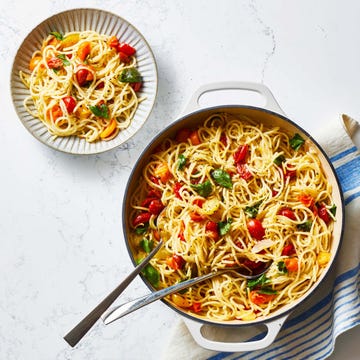
A 7-Day, 1,400 Calorie Plan
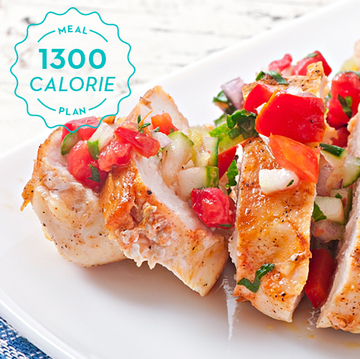
A 7-Day, 1,300-Calorie Meal Plan




















